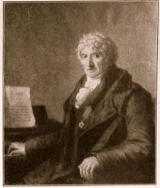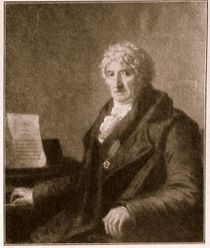
Pierre-Alexandre Monsigny
Encyclopedia

Composer
A composer is a person who creates music, either by musical notation or oral tradition, for interpretation and performance, or through direct manipulation of sonic material through electronic media...
and a member of the French Académie des Beaux-Arts
Académie des beaux-arts
The Académie des Beaux-Arts is a French learned society. It is one of the five academies of the Institut de France.It was created in 1795 as the merger of the:* Académie de peinture et de sculpture...
(1813).
He is considered alongside André Grétry and François-André Danican Philidor
François-André Danican Philidor
François-André Danican Philidor , often referred to as André Danican Philidor during his lifetime, was a French composer and chess player. He contributed to the early development of the opéra comique...
to have been the founder of a new musical genre, the opéra comique
Opéra comique
Opéra comique is a genre of French opera that contains spoken dialogue and arias. It emerged out of the popular opéra comiques en vaudevilles of the Fair Theatres of St Germain and St Laurent , which combined existing popular tunes with spoken sections...
, laying a path for other French composers such as François-Adrien Boieldieu
François-Adrien Boïeldieu
François-Adrien Boieldieu was a French composer, mainly of operas, often called "the French Mozart".-Biography:...
, Daniel-François-Esprit Auber
Daniel Auber
Daniel François Esprit Auber was a French composer.-Biography:The son of a Paris print-seller, Auber was born in Caen in Normandy. Though his father expected him to continue in the print-selling business, he also allowed his son to learn how to play several musical instruments...
, Charles Gounod
Charles Gounod
Charles-François Gounod was a French composer, known for his Ave Maria as well as his operas Faust and Roméo et Juliette.-Biography:...
, Georges Bizet
Georges Bizet
Georges Bizet formally Alexandre César Léopold Bizet, was a French composer, mainly of operas. In a career cut short by his early death, he achieved few successes before his final work, Carmen, became one of the most popular and frequently performed works in the entire opera repertory.During a...
, and Jules Massenet
Jules Massenet
Jules Émile Frédéric Massenet was a French composer best known for his operas. His compositions were very popular in the late 19th and early 20th centuries, and he ranks as one of the greatest melodists of his era. Soon after his death, Massenet's style went out of fashion, and many of his operas...
in this genre.
Paul Dukas
Paul Dukas
Paul Abraham Dukas was a French composer, critic, scholar and teacher. A studious man, of retiring personality, he was intensely self-critical, and he abandoned and destroyed many of his compositions...
is quoted as saying, "Of all the composers of our country, he may be the first who had the gift of true, human emotion, of communicative expression and of fair feeling".
Biography
Pierre-Alexandre Monsigny was born at FauquemberguesFauquembergues
Fauquembergues is a commune in the Pas-de-Calais department in the Nord-Pas-de-Calais region of France.-Geography:A town situated 10 miles southwest of Saint-Omer, at the junction of the D928 with two minor roads, the D92 and the D158...
, near Saint-Omer
Saint-Omer
Saint-Omer , a commune and sub-prefecture of the Pas-de-Calais department west-northwest of Lille on the railway to Calais. The town is named after Saint Audomar, who brought Christianity to the area....
, in the former Artois
Artois
Artois is a former province of northern France. Its territory has an area of around 4000 km² and a population of about one million. Its principal cities are Arras , Saint-Omer, Lens and Béthune.-Location:...
region of France (now Pas-de-Calais), four months before the marriage of his parents, Marie-Antoinette Dufresne and Nicolas Monsigny.
He was educated at the Collége des Jésuites Wallons in Saint-Omer. It was here that he first discovered his aptitude for music.
As the eldest child, in 1749, a few months after his father's death, he left for Paris with only a few coins in his pocket, a violin
Violin
The violin is a string instrument, usually with four strings tuned in perfect fifths. It is the smallest, highest-pitched member of the violin family of string instruments, which includes the viola and cello....
and a recommendation letter, in an attempt to further his musical career and provide for his siblings. He entered into the service of a M. de Saint-Julien, in the bureau of the Comptabilité du Clergé de France. In 1752, after watching a performance of La serva padrona
La serva padrona
La serva padrona is an opera buffa by Giovanni Battista Pergolesi to a libretto by Gennaro Antonio Federico, after the play by Jacopo Angello Nelli. The opera is only 45 minutes long and was originally performed as an intermezzo between the acts of a larger serious opera...
by Giovanni Battista Pergolesi
Giovanni Battista Pergolesi
Giovanni Battista Pergolesi was an Italian composer, violinist and organist.-Biography:Born at Iesi, Pergolesi studied music there under a local musician, Francesco Santini, before going to Naples in 1725, where he studied under Gaetano Greco and Francesco Feo among others...
at the Paris Opera
Paris Opera
The Paris Opera is the primary opera company of Paris, France. It was founded in 1669 by Louis XIV as the Académie d'Opéra and shortly thereafter was placed under the leadership of Jean-Baptiste Lully and renamed the Académie Royale de Musique...
, he decided upon his true vocation. He then became Gianotti's student, and a counter-bassist at the Paris Opéra.
Secretly, with a text by Laribardière, he wrote Les aveux indiscrets, his first comical opera, which premiered at the theater of the Foire St Germain in February 1759. This work was well-received and encouraged him to compose a second opera, in two acts, on a libretto
Libretto
A libretto is the text used in an extended musical work such as an opera, operetta, masque, oratorio, cantata, or musical. The term "libretto" is also sometimes used to refer to the text of major liturgical works, such as mass, requiem, and sacred cantata, or even the story line of a...
by Pierre-René Lemmonier. Le maître en droit, the following year, received the same response. Michel-Jean Sedaine
Michel-Jean Sedaine
Michel-Jean Sedaine was a French dramatist, was born in Paris.- Biography :His father, who was an architect, died when Sedaine was quite young, leaving no fortune, and the boy began life as a mason's labourer...
, a well-liked librettist, proposed to Monsigny to collaborate with him, following Le cadi dupés success. Their common production was excellent: On ne s'avise jamais de tout, Le roi et le fermier and Rose et Colas. On April 15, 1766, at the Académie royale de Musique, his epic ballet in three acts Aline, reine de Golconde was not as successful as expected. The critics were harsher two years later, with L'île sonnante. The music, it is true, preserves its usual grace of Monsigny's touch. However, Charles Collé
Charles Collé
Charles Collé was a French dramatist and songwriter.The son of a notary, he was born in Paris. He became interested in the rhymes of Jean Heguanier, the most famous writer of couplets in Paris. From a notary's office, Collé was transferred to that of the receiver-general of finance, where he...
's booklet happened to be unadapted and justified its little success.
It is during this same year of 1768 that the composer bought the charge of Head Waiter at the service of the Louis Philippe I, Duke of Orléans
Louis Philippe I, Duke of Orléans
Louis Philippe d'Orléans known as le Gros , was a French nobleman, a member of a cadet branch of the House of Bourbon, the dynasty then ruling France. The First Prince of the Blood after 1752, he was the most senior male at the French court after the immediate royal family. He was the father of...
. This patronal environment favored a little more his inspiration. Michel-Jean Sedaine
Michel-Jean Sedaine
Michel-Jean Sedaine was a French dramatist, was born in Paris.- Biography :His father, who was an architect, died when Sedaine was quite young, leaving no fortune, and the boy began life as a mason's labourer...
submitted his libretto, Le déserteur
Le déserteur
Le déserteur is an opéra comique by the French composer Pierre-Alexandre Monsigny with a libretto by Michel-Jean Sedaine. It was first staged at the Comédie-Italienne, Paris on 6 March 1769....
, for which he composed his most successful score. Yet Le faucon, created in 1771 was a failure. On August 17, 1775, La belle Arsène caused controversy among critics.
In 1777, following the success of Félix, ou L'enfant trouvé, Monsigny stopped composing. At the beginning of 1784, he married Amélie de Villemagne, with whom he lived peacefully until 1789. The French Revolution
French Revolution
The French Revolution , sometimes distinguished as the 'Great French Revolution' , was a period of radical social and political upheaval in France and Europe. The absolute monarchy that had ruled France for centuries collapsed in three years...
and The Terror
Reign of Terror
The Reign of Terror , also known simply as The Terror , was a period of violence that occurred after the onset of the French Revolution, incited by conflict between rival political factions, the Girondins and the Jacobins, and marked by mass executions of "enemies of...
deprived them of all their material existence. The musician and his family sank into deep misery and oblivion for a few years. Hearing of the composer's state of poverty, the members of the Opéra-Comique
Opéra-Comique
The Opéra-Comique is a Parisian opera company, which was founded around 1714 by some of the popular theatres of the Parisian fairs. In 1762 the company was merged with, and for a time took the name of its chief rival the Comédie-Italienne at the Hôtel de Bourgogne, and was also called the...
gave him a pension of 2400 pounds, in order to prove their gratitude to one of the founders of their theater.
The years of adversity came to an end and Monsigny reached once again his deserved success. He became inspector of teaching at the Conservatoire de Musique de Paris
Conservatoire de Paris
The Conservatoire de Paris is a college of music and dance founded in 1795, now situated in the avenue Jean Jaurès in the 19th arrondissement of Paris, France...
. In 1804, he received the title of Chevalier de la Légion d'honneur. In 1813, he succeeded Grétry at the Institute. Total blindness afflicted his last years. Monsigny died in Paris.

